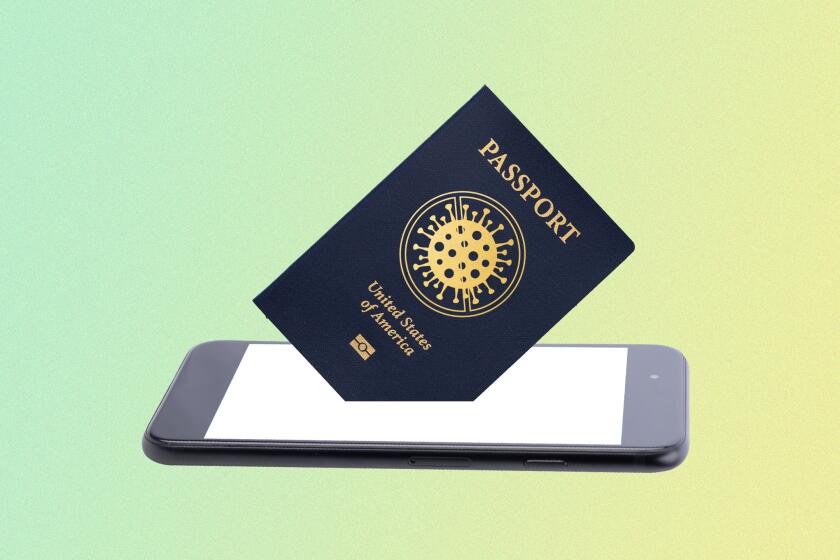On cusp of tourist season, EU proposes reopening its borders

- Share via
BRUSSELS — In an announcement sure to be welcomed by travelers worldwide, European Union officials Monday proposed easing restrictions on visiting the 27-nation bloc as COVID-19 vaccination campaigns across the continent gather speed.
Travel to the EU by non-EU citizens is currently extremely limited, except for visitors from a handful of countries with low coronavirus infection rates. But with the summer tourist season looming, the European Commission hopes the new recommendations will dramatically expand that list.
“The commission proposes to allow entry to the EU for nonessential reasons not only for all persons coming from countries with a good epidemiological situation, but also all people who have received the last recommended dose of an EU-authorized vaccine,” it said.
COVID-19 vaccines authorized by the European Medicines Agency, the bloc’s drug regulator, include the Pfizer, Moderna, AstraZeneca and Johnson & Johnson shots. The EMA has not approved any vaccines from Russia or China as of yet but is looking at data for Russia’s Sputnik V shot.
The commission hopes that border controls could be relaxed by June.
EU nations could also individually decide to accept travelers immunized with vaccines listed by the World Health Organization for emergency use. The organization has approved the same four vaccines as the EMA, and is expected to make a ruling soon on China’s Sinopharm vaccine.
Europe has surpassed 1 million deaths from COVID-19, more than one-third the global total of nearly 3 million, the World Health Organization says.
Commission spokesman Adalbert Jahnz said fully vaccinated travelers coming from outside the EU should be allowed to visit but insisted that the proposal’s goal is not to exempt them from testing or quarantines upon arrival.
“This still remains very much in the hands of the member states,” he said.
The commission also proposed raising the threshold of new coronavirus cases that is used to determine the countries from which all travel should be permitted.
“Nonessential travel regardless of individual vaccination status is currently permitted from seven countries with a good epidemiological situation,” it said, proposing to increase the 14-day cumulative coronavirus infection rate from 25 to 100 per 100,000 inhabitants.
“This remains considerably below the current EU average, which is over 420,” it said.
We explain what vaccine passports are, how they work, where they’ve been implemented, and why some people object to them.
It was unclear which countries would actually make the cut, but an EU official who was not authorized to be quoted by name because the proposal has yet to be adopted said Israel would definitely be on the list.
“The U.K. — question mark. The U.S. — for the time being, not quite,” he said. “But we see how quickly the situation in the U.S. is evolving, notably for the rate of vaccination.”
In case the infection situation deteriorates in a non-EU country, the commission proposed an “emergency brake” to stop dangerous coronavirus variants from entering the bloc through quickly enacted travel limits.
EU officials and nations are also talking about introducing COVID-19 certificates aimed at facilitating travel across the region this summer. The documents, sometimes called coronavirus passports or green certificates, would be given to EU residents who can prove they have been vaccinated or prove they have recovered from COVID-19.
Breaking News
Get breaking news, investigations, analysis and more signature journalism from the Los Angeles Times in your inbox.
You may occasionally receive promotional content from the Los Angeles Times.
“Until the digital green certificate is operational, member states should be able to accept certificates from non-EU countries,” the commission said, adding that unvaccinated children should be able to travel with their vaccinated parents if they provide a negative PCR test.
Hungary jumped ahead of its fellow EU nations Saturday, loosening several COVID-19 restrictions for people with government-issued immunity cards. The cards were given out to those who have had one vaccine dose or those who recovered from COVID-19.
People with the plastic cards could enter indoor dining rooms, hotels, theaters, cinemas, spas, gyms, libraries, museums and other recreational venues in Hungary.
The whole issue of COVID-19 passports is fraught in many parts of the world, with critics saying they discriminate against people in poorer nations or younger people who do not have access to vaccines in many countries. The Hungarian government moved ahead with its own certificates because it has been inoculating its people with a variety of vaccines, including shots from China and Russia that have not been approved by the EMA.
More to Read
Sign up for Essential California
The most important California stories and recommendations in your inbox every morning.
You may occasionally receive promotional content from the Los Angeles Times.












